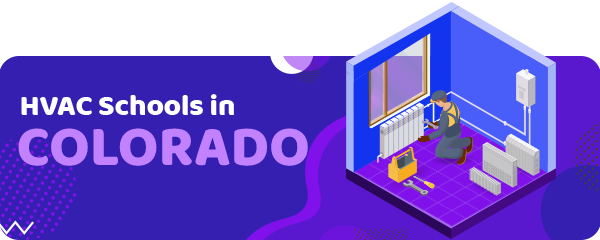Colorado and a few other states don’t require a license for HVAC workers.
However, it’s good to get certified because there are some situations in which it is needed.
Additionally, if you want to advance in your career, the license will prove useful.
Article Table of Contents
Job Outlook and Salary
It’s important to know that in the next decade, there will be a 13.6% increased demand for HVAC workers in Colorado.
On average, such a professional would earn $46,508 per year, while those at the higher end of the spectrum make around $52 700 per year.
The national average salary for an HVAC worker is of $46,648 per year and the highest one is of $52,858.
Annual Salary Range:
Location
Avg. Annual Salary
Denver
$47,175
Colorado Springs
$46,428
Aurora
$47,144
Fort Collins
$45,411
Thornton
$47,175
Arvada
$47,175
Westminster
$47,175
Pueblo
$43,261
Boulder
$47,860
Greeley
$45,604
Regional Salary in Colorado
Region
Employed
Avg. Annual Salary
Avg. Hourly Pay
Top 10% Annual Salary
Bottom 10% Annual Salary
Boulder, CO 290 $63,750 $30.65 $86,580 $41,750 Colorado Springs, CO 790 $60,480 $29.08 $90,380 $37,150 Denver-Aurora-Lakewood, CO 3,870 $66,150 $31.8 $97,090 $46,340 Fort Collins, CO 600 $63,120 $30.34 $95,590 $41,550 Grand Junction, CO 260 $55,500 $26.68 $78,300 $37,880 Greeley, CO 330 $59,210 $28.46 $90,310 $36,700 Pueblo, CO 180 $59,940 $28.82 $90,120 $36,640
* Employment conditions in your area may vary.
Related Licenses
If you plan on working in 2 interconnected areas, you will need a license.
These areas are:
- electrician/electrical work
- plumbing
HVAC techs might have to perform a lot of electrical work, and as such, an electrician license will be needed.
Make sure to check out the requirements for becoming an electrician.
You should know that electricians, regardless of level (journeyman, master, or even residential wireman) learn how to perform electrical work with heating systems.
Colorado and the following states have a reciprocal agreement for journeymen electricians:
- Alaska
- Arkansas
- Minnesota
- Montana
- Nebraska
- New Hampshire
- New Mexico
- North Dakota
- Oklahoma
- South Dakota
- Utah
- Washington
- Wyoming
We’ll have a look at the requirements you must meet in Denver, as this is the largest city in Colorado.
Here there are only 4 classes of licensing specifically related to heating, ventilation and air conditioning:
- residential (only
- journeyman
- Class A supervisor
- Class B supervisor.
There are also 4 categories for those working with refrigeration systems:
- operator,
- journeyman
- Class A supervisor
- Class B supervisor
If you’ll be working with gas systems, hot water or steam heat, and boilers, you’ll need a different, separate certification.
The Denver municipal website has more information.
As an HVAC tech, you might be required to perform plumbing work, and you’ll need a certification for this as well.
Don’t forget to also check the requirements for your profession in the city or county you’ll be working in.
Business License
If you want to run your own business in this field, you’ll need a specific license for this purpose.
However, you’ll have to check with your local county or city for the requirements you must meet as there’s no state-wide regulation.
EPA Certification
Section 608 from the EPA requires everyone in the USA to hold a certification if they work with refrigerants in the USA.
HVAC Schools in Colorado
Below you can find the Colorado schools offering an HVAC certification.
| School Name | Address |
|---|---|
| Emily Griffith Technical College | 1250 Welton Street Denver, Colorado 80204 |
| Front Range Community College | 3645 W 112th Ave Westminster, Colorado 80031 |
| Lincoln College of Technology | 11194 E 45th Ave Denver, Colorado 80239 |
| Pickens Technical College | 500 Airport Blvd Aurora, Colorado 80011 |
| Pikes Peak Community College | 5675 S Academy Blvd Colorado Springs, Colorado 80906 |
| Redstone College | 10851 W 120th Ave Broomfield, Colorado 80021 |
Conclusion
Colorado has an extreme type of weather, and so using an HVAC system might improve quality of life.
Even though you’re not officially required to own a license for these systems, it’s still a good idea to know the regulations in the country you’ll be working in.
Read the full guide: How to Become an HVAC Technician
